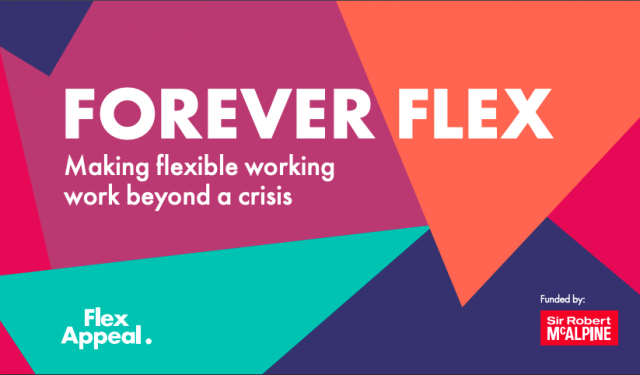Making flexible working work beyond a crisis

For anyone who missed it (despite my furious social activity), our report – Forever Flex: Making flexible working work beyond a crisis – launched earlier this month and is now available to download from Mother Pukka’s website.
What’s it all about?
We were commissioned to develop the report after forming a partnership with the Flex Appeal campaign and securing funding from Sir Robert McAlpine back in 2019 – a coalition which came about through our shared passion for flexible working.
Between us we wanted to find a way of reducing the gap between the 87% people who want flexible working and the 27% of those who currently get it. To make the lives of people, everyone, not just parents, better and more balanced. So, we set out to find a way of reaching employers with something a bit more human and emotional than the swathes of toolkits, business case statistics and PowerPoints that currently make their way into HR inboxes.
What you see in the report is the culmination of a summer’s worth of research amongst 32 employers from up and down the country, of all shapes and sizes. It is a distillation of their collective wisdoms, their stories and experiences (good and bad) of making flexible working work long before the crisis set in. It provides employers with a set of realistic strategies for how to make flexible working sustainable beyond a pandemic.
Why is this important?
We’re in a state of massive change right now, hundreds of employers radically altered the way they work, overnight. Huge numbers of people are working remotely but despite the news headlines (think “big tech firm tells everyone to work from home for good”) what we’re seeing now is not a shift to more people doing true flexible working. It’s actually Fake Flex. Hurried flex, accidental flex and without the necessary strategies and support systems in place this could be really detrimental to the working world.
Forced remote working is not the same as good, healthy, varied flexible working in all its forms with all the benefits.
We must be mindful of this.
Who’s the report for?
I’d say it’s a critical read for any decision makers or leaders within a business who want to use this time of crisis as an opportunity to make long-lasting, meaningful change (particularly those who may have previously come up against barriers to do so).
It’s for anyone who wants to help their organisation avoid Fake Flex or even just for anyone who might be curious about flex but wants to hear about it from another employer’s perspective, not some outside ‘expert’.
So please read it, share it, try some stuff out and, if you’d like to hear more about the report, you can watch a discussion between me and Lynda Thwaite (Group Director of marketing at Sir Robert McAlpine) at Flexpo Digital or listen to Anna Whitehouse (aka Mother Pukka, founder of Flex Appeal) talking about it on Radio4’s Women’s Hour.
What’s next for flex?
For Claremont, flexible working has been part of our DNA since day one – affecting not only our internal culture but almost every issue we work on, be it access to health screening, mental health at work or improving a child’s brain development. We look forward to continuing this partnership with Flex Appeal and Sir Robert McAlpine and seeing what change we can make in 2021.

